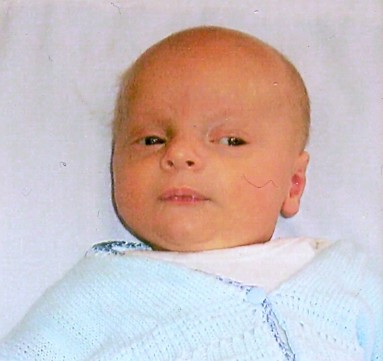 We had Joni’s photos done for his UK passport so we can take him to meet the family next year. Passport photo rules say he has to have his eyes open, so we had to do mean things to him in the shop to wake him up, gathering ourselves an audience in the process. Then the rules say that no-one else has to be visible, so we were trying to contort the pair of us so that we could hold him up to the background cloth without being seen, only of course he can’t hold his own head up yet so it didn’t work too well. Eventually we took the background cloth thing off its runners and laid it on the counter, and put the baby on top of it, and then the guy taking the photo stood on a stool and looked down on his face.
We had Joni’s photos done for his UK passport so we can take him to meet the family next year. Passport photo rules say he has to have his eyes open, so we had to do mean things to him in the shop to wake him up, gathering ourselves an audience in the process. Then the rules say that no-one else has to be visible, so we were trying to contort the pair of us so that we could hold him up to the background cloth without being seen, only of course he can’t hold his own head up yet so it didn’t work too well. Eventually we took the background cloth thing off its runners and laid it on the counter, and put the baby on top of it, and then the guy taking the photo stood on a stool and looked down on his face.Hopefully it will good enough for the passport people, although to be honest it all seems like rather a waste of hassle given that within a few weeks he won’t look anything like his passport anyway. Our friend Ben says “it would be more of a worry if it did (look like him); how many people do you know who look like their passport photo?” Still we provided some amusement for the general public of Cordoba; service to the community and all that. Next job is to take all the paper-work to the British consulate in Buenos Aires, and see if we can swop it for a passport.
On a different tack, we have solved the mystery of Joni’s missing red blood cells that I mentioned a couple of blogs ago. They tested all three of us for a bunch of possibilities, and discovered that both Martin and Joni have pherocytosis (it’s ferocitosis in Spanish, took me ages to figure out why I wasn’t getting any hits in English… stupid spelling). In the sort of terminology that I can understand, it is a hereditary condition characterised by a defect in the wall of some red blood cells causing them to be sphere shaped rather than egg-timer shaped, and therefore less elastic and more easily broken. There are some potential complications in a small percentage of cases, but the doctor says that more often than not, the first a person knows about it is when their offspring shows up as being anaemic; as with Martin and Joni.
The Hospital Privado, not being enormous, has a combined hematology and oncology department. There can be fewer things more symptomatic of the injustice of this world than the sight of little kids having chemo. We are really grateful that while our kid may not yet have hair, he is healthy, chubby and currently asleep.
 We carried these hammocks here with us from England and we hadn’t really had the use of them. But now we’ve discovered that Joni likes being swung, so we dug the hammock out. Except he didn’t like going in it on his own, so somebody had to sacrifice themselves to accompany him.
We carried these hammocks here with us from England and we hadn’t really had the use of them. But now we’ve discovered that Joni likes being swung, so we dug the hammock out. Except he didn’t like going in it on his own, so somebody had to sacrifice themselves to accompany him.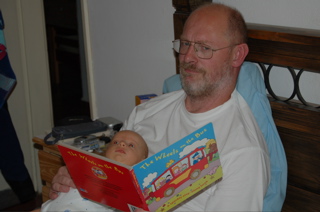 Daddy was looking forward to a good theological discussion, but settled for a compromise and an exegesis of “The Wheels on the bus”… “Now this story tells us that at one time the UK had public transport. Notice that each stanza finishes with the line all day long which tells us how long it took to get anywhere…”
Daddy was looking forward to a good theological discussion, but settled for a compromise and an exegesis of “The Wheels on the bus”… “Now this story tells us that at one time the UK had public transport. Notice that each stanza finishes with the line all day long which tells us how long it took to get anywhere…”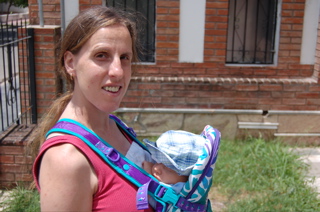 We’re doing rather well for presents at the moment. This rather posh baby-carrier is thanks to some fantastic friends. It is fully adjustable in a zillion directions, holds him securely in a good position, and can be worn facing in or out. (Now why aren’t they paying me for this advert?) In fact it even works on…
We’re doing rather well for presents at the moment. This rather posh baby-carrier is thanks to some fantastic friends. It is fully adjustable in a zillion directions, holds him securely in a good position, and can be worn facing in or out. (Now why aren’t they paying me for this advert?) In fact it even works on… 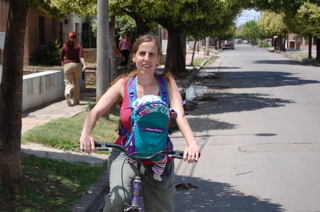 … the bike! Joni thinks it’s great too; he even fell asleep in it as we were peddling home from the post-office the other day (for the record we should clarify that mummy was doing all the peddling). Look closely and notice his stripey trousers, sent by granny and grandad from England. Now all we need is a generous benefactor to offer to do the 4 o’clock in the morning shift…
… the bike! Joni thinks it’s great too; he even fell asleep in it as we were peddling home from the post-office the other day (for the record we should clarify that mummy was doing all the peddling). Look closely and notice his stripey trousers, sent by granny and grandad from England. Now all we need is a generous benefactor to offer to do the 4 o’clock in the morning shift… I improvised us a sling using a single bed sheet, mostly for the times when he is grizzling but doesn’t appear to want anything. It’s not Joni’s favourite mode of transport, but in the scale of things he likes it better than being abandoned to whinge in his cot. This is the view I have of him when I cross my eyes and look down my nose…
I improvised us a sling using a single bed sheet, mostly for the times when he is grizzling but doesn’t appear to want anything. It’s not Joni’s favourite mode of transport, but in the scale of things he likes it better than being abandoned to whinge in his cot. This is the view I have of him when I cross my eyes and look down my nose…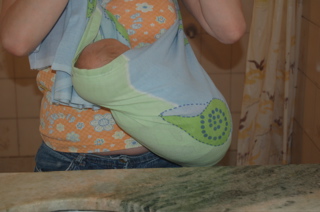 Here we are cleaning the bathroom together… To be honest he’s not a great asset to the cleaning process. But he is quite useful as a fashion accessory to hide my “not quite yet back to pre-pregnancy” stomach.
Here we are cleaning the bathroom together… To be honest he’s not a great asset to the cleaning process. But he is quite useful as a fashion accessory to hide my “not quite yet back to pre-pregnancy” stomach. Some lovely friends sent us some money for Joni, so we had fun shopping for presents. This is his favourite, a cot mobile with beany-animals, which spins around and plays a truly dire version of Frere Jacques. Joni loves it. Martin is hoping that his musical tastes might improve as he gets older. He played him Beethoven’s Eroica the other day to try and help the refining process along a bit…
Some lovely friends sent us some money for Joni, so we had fun shopping for presents. This is his favourite, a cot mobile with beany-animals, which spins around and plays a truly dire version of Frere Jacques. Joni loves it. Martin is hoping that his musical tastes might improve as he gets older. He played him Beethoven’s Eroica the other day to try and help the refining process along a bit…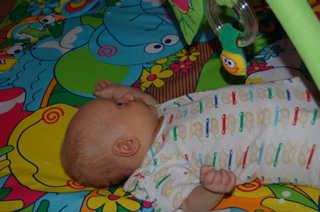 And this is a multi-sensory baby gym type affair including a textured mat, and things hanging over the top of it. He’s just getting the idea that a good swipe at one of the hanging rattles makes for a satisfying noise. We’re hoping that he might see this as an interesting environment for practising his skills, as an alternative to swiping the contents of the bathroom work-surface onto the floor, and rolling himself into the sink…
And this is a multi-sensory baby gym type affair including a textured mat, and things hanging over the top of it. He’s just getting the idea that a good swipe at one of the hanging rattles makes for a satisfying noise. We’re hoping that he might see this as an interesting environment for practising his skills, as an alternative to swiping the contents of the bathroom work-surface onto the floor, and rolling himself into the sink… Now we have a car. It’s not as photogenic as a baby, but it is more functional as a method of transport. We received some insurance money from Martin’s road accident; and Dany, our friend and colleague in Latin Link Argentina was selling his car. It seemed like a good swop, and saved us from having to deal with dodgy secondhand-car-salesmen. Dany also did all the paperwork with us which was a big bonus, knowing what we already know about paperwork and Argentina.
Now we have a car. It’s not as photogenic as a baby, but it is more functional as a method of transport. We received some insurance money from Martin’s road accident; and Dany, our friend and colleague in Latin Link Argentina was selling his car. It seemed like a good swop, and saved us from having to deal with dodgy secondhand-car-salesmen. Dany also did all the paperwork with us which was a big bonus, knowing what we already know about paperwork and Argentina.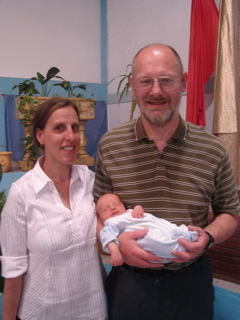 This is us looking halfway scrubbed and presentable at Joni’s official presentation at church, which took place on Sunday.
This is us looking halfway scrubbed and presentable at Joni’s official presentation at church, which took place on Sunday.  The presentation / dedication ceremony is a little rite of passage in practice in many churches, particularly those who reserve baptism for adult believers. We were brought to the front, Joni held up for all to see (imagine sound-track with lots of ooohs and ahhs), the elders prayed for him and for us, and he was officially welcomed into the family of the church.
The presentation / dedication ceremony is a little rite of passage in practice in many churches, particularly those who reserve baptism for adult believers. We were brought to the front, Joni held up for all to see (imagine sound-track with lots of ooohs and ahhs), the elders prayed for him and for us, and he was officially welcomed into the family of the church. 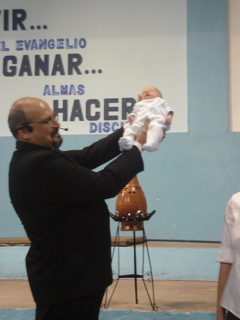 Exodus 29:41 “Sacrifice the other lamb at twilight with the same grain offering and its drink offering as in the morning—a pleasing aroma, an offering made to the LORD by fire”…. Oops.. wrong passage….
Exodus 29:41 “Sacrifice the other lamb at twilight with the same grain offering and its drink offering as in the morning—a pleasing aroma, an offering made to the LORD by fire”…. Oops.. wrong passage….
 This little person in our lives is 40 cms long, he does nothing except eat and sleep, and yet he has taken over the universe. Forget WMDs, if you’re looking for global domination, this is the real thing. How does he manage it? At three o’clock this morning while I was feeding him (need to have something to think about if we’re going to be awake at three in the morning) I realised that eight out of every 24 hours are taken up with the feeding / changing thing. And that’s before we factor in the washing, shopping, cooking, and all the other aspects of “general living”.
This little person in our lives is 40 cms long, he does nothing except eat and sleep, and yet he has taken over the universe. Forget WMDs, if you’re looking for global domination, this is the real thing. How does he manage it? At three o’clock this morning while I was feeding him (need to have something to think about if we’re going to be awake at three in the morning) I realised that eight out of every 24 hours are taken up with the feeding / changing thing. And that’s before we factor in the washing, shopping, cooking, and all the other aspects of “general living”.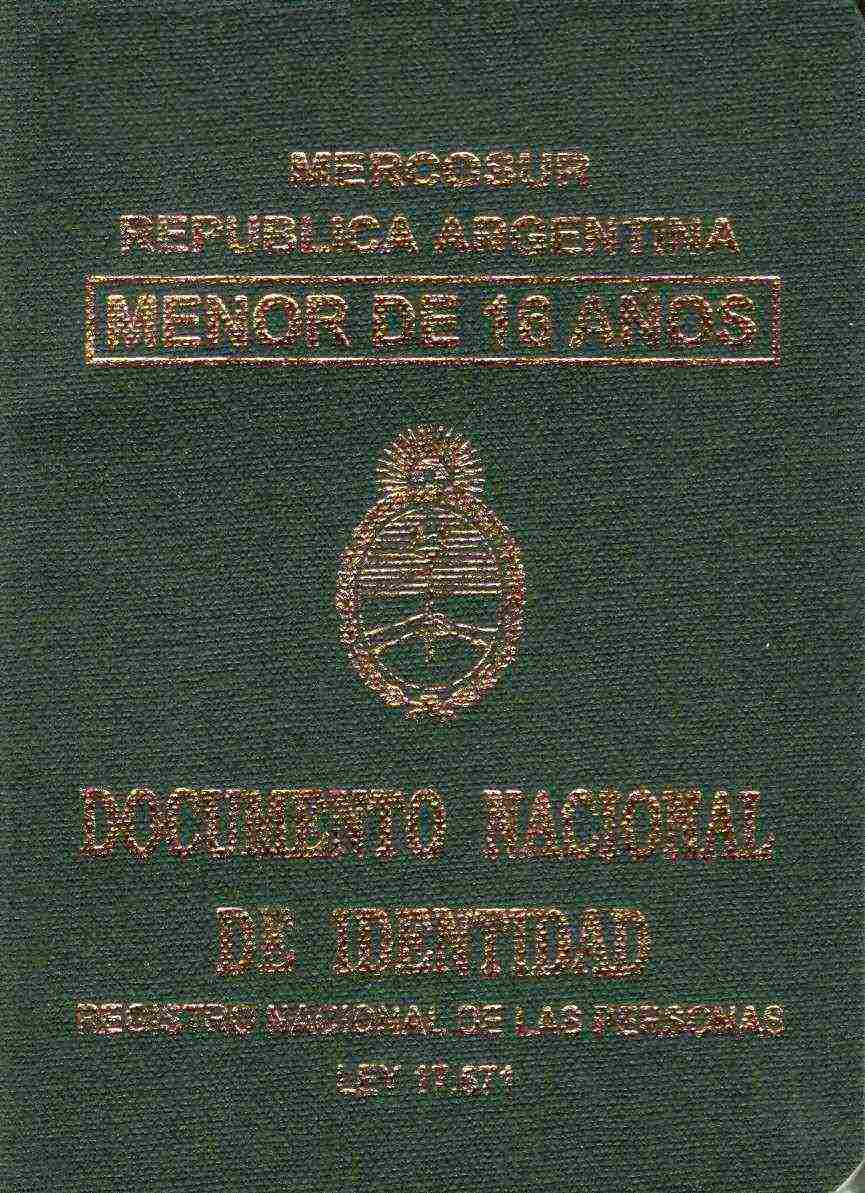 Monday we were back to the civil registry for another “Argentina day”. That took three hours. Then we thought we’d “pop” into the post office. That took another two hours during which we nearly lost the will to live a few times. Note to self; “pop” and “post-office” should not be used in the same sentence. We are very grateful for three things… one, that we live in a country where it is perfectly socially acceptable to breast-feed ones baby in any queue that one happens to be sitting in; two, that we managed to get out of the post-office alive; and most of all, that Joni now has his Argentinian DNI (ID document). We’re ridiculously excited about that, if you think about Argentinian paper-work as a game of snakes and ladders, then we’re like a pair of little kids who’ve rolled a six to go up one big ladder.
Monday we were back to the civil registry for another “Argentina day”. That took three hours. Then we thought we’d “pop” into the post office. That took another two hours during which we nearly lost the will to live a few times. Note to self; “pop” and “post-office” should not be used in the same sentence. We are very grateful for three things… one, that we live in a country where it is perfectly socially acceptable to breast-feed ones baby in any queue that one happens to be sitting in; two, that we managed to get out of the post-office alive; and most of all, that Joni now has his Argentinian DNI (ID document). We’re ridiculously excited about that, if you think about Argentinian paper-work as a game of snakes and ladders, then we’re like a pair of little kids who’ve rolled a six to go up one big ladder.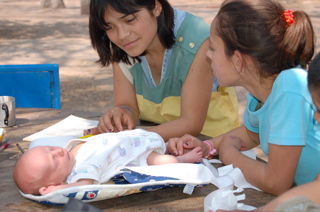 Thursday we went to the childrens’ home in San Marcos for the first time since Joni was born. The kids have all charted the progress of my growing belly from gestation to three days before the birth, so it only seemed right that they should meet him in real life while he’s still new and little. Inevitably we ended up doing some work, impossible not to, but mostly we spent the day playing outside in the sunshine, while Joni had a whale of a time being mauled and prodded by young and old. Luckily he really likes people, noise, movement, and going on the bus!
Thursday we went to the childrens’ home in San Marcos for the first time since Joni was born. The kids have all charted the progress of my growing belly from gestation to three days before the birth, so it only seemed right that they should meet him in real life while he’s still new and little. Inevitably we ended up doing some work, impossible not to, but mostly we spent the day playing outside in the sunshine, while Joni had a whale of a time being mauled and prodded by young and old. Luckily he really likes people, noise, movement, and going on the bus!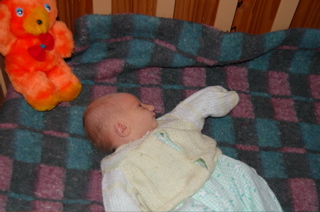 The Hospital Privado let us out again on Wednesday morning. Luckily mummy had managed to dash into town between feeds and more or less put the cot together. So now Joni has a proper bed, complete with orange Teddy, who was hand-made by David, one of the guys whom Martin visits in prison.
The Hospital Privado let us out again on Wednesday morning. Luckily mummy had managed to dash into town between feeds and more or less put the cot together. So now Joni has a proper bed, complete with orange Teddy, who was hand-made by David, one of the guys whom Martin visits in prison. 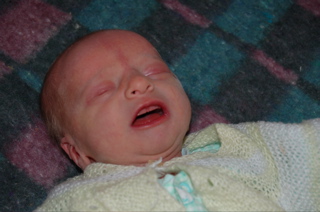 Latest addition to the list of complaints… being put in his cot. O perverse boy-child of your father…
Latest addition to the list of complaints… being put in his cot. O perverse boy-child of your father…  Here he is, looking slightly surreal and purple. Latest list of complaints: having his clothes removed, being dumped into a plastic crate, being blindfolded. Parents also have a complaint to register: not being allowed to sleep last night… never mind, when he’s fourteen we’ll probably be looking fondly back on the nights when he kept us awake by staying in rather than by going out!
Here he is, looking slightly surreal and purple. Latest list of complaints: having his clothes removed, being dumped into a plastic crate, being blindfolded. Parents also have a complaint to register: not being allowed to sleep last night… never mind, when he’s fourteen we’ll probably be looking fondly back on the nights when he kept us awake by staying in rather than by going out!